| Listing 1 - 10 of 15 | << page >> |
Sort by
|
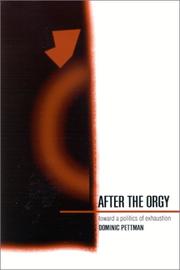
ISBN: 0791488497 0585476136 9780585476131 0791453960 9780791453964 0791453952 9780791453957 9780791488492 Year: 2002 Publisher: Albany : State University of New York Press,
Abstract | Keywords | Export | Availability | Bookmark
 Loading...
Loading...Choose an application
- Reference Manager
- EndNote
- RefWorks (Direct export to RefWorks)
Applying Jean Baudrillard's question "What are you doing after the orgy?" to the postmillennial climate that informs our contemporary cultural moment, this book argues that the imagination of apocalyptic endings has been an obsessive theme in post-Enlightenment culture. Dominic Pettman identifies and examines the dynamic tensions of various apocalyptic discourses, from the fin-de-siècle decadents of the 1890s to the fin-de-millènnium cyberpunks of the 1990s, in order to highlight the complex constellation of exhaustion, anticipation, panic, and ecstasy in contemporary culture. Through analyses of rapturous cults, cyberpunk literature, post-apocalyptic cinema, techno-paganism, death fashion, and the Y2K prophecy, After the Orgy explores why the twentieth century swung so violently between the poles of anticipation and anticlimax. In the process, the book raises pressing questions concerning the relevance of such ideas in our new millennium and points out alternatives to the monotonous horror of traditional narratives.
Civilization, Modern --- Millennialism. --- Amillennialism --- Chiliasm --- Millenarianism --- Millennianism --- Postmillennialism --- Premillennialism --- Dispensationalism --- Fundamentalism --- Millennium (Eschatology)
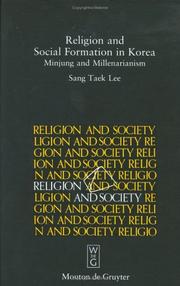
ISBN: 3110147971 3111797260 3110893118 9783110893113 9783110147971 Year: 1996 Volume: 37 Publisher: Berlin New York
Abstract | Keywords | Export | Availability | Bookmark
 Loading...
Loading...Choose an application
- Reference Manager
- EndNote
- RefWorks (Direct export to RefWorks)
Millennialism --- Minjung theology --- History of doctrines --- History --- Korea --- Religion --- -Minjung theology --- -Theology, Doctrinal --- Amillennialism --- Chiliasm --- Millenarianism --- Millennianism --- Postmillennialism --- Premillennialism --- Dispensationalism --- Fundamentalism --- Millennium (Eschatology) --- Religion. --- -History of doctrines --- -Amillennialism --- Millennialism - Korea - History. --- Minjung theology - History. --- Korea - Religion. --- Theology, Doctrinal --- History of doctrines. --- History. --- Millennialism - Korea - History of doctrines --- Minjung theology - History --- Korea - Religion
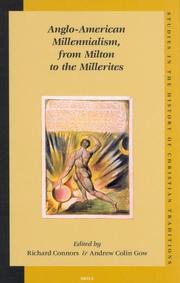
ISBN: 9004138218 9786610915064 9047405242 1280915064 1429408073 9781429408073 9789004138216 9781280915062 6610915067 9789047405245 Year: 2004 Volume: 113 Publisher: Leiden Boston
Abstract | Keywords | Export | Availability | Bookmark
 Loading...
Loading...Choose an application
- Reference Manager
- EndNote
- RefWorks (Direct export to RefWorks)
Neither the meliorist political culture of the nascent American republic nor its later drift toward apocalyptically tinged 'fundamentalist' Protestantism and dispensationalism can be explained outside the context of the shared Anglo-American traditions and practices of millennial expectation and apocalyptic angst--whether expressed by early colonists, Milton, Blake, Miller or the Continental Congress. In this chronologically direct and thematically varied volume, five scholars working in three distinct disciplines (Religion, English literature, and History) approach millennialism and apocalypticism in the British and Anglo-American contexts, making remarkable contributions both to the study of religious, literary and political culture in the English-speaking ecumene, and, at least implicitly, to the critique of disciplinary exclusivity. Only in such mixed company does the study of the millennial nexus in English and American religion, culture, literature and politics, from the time of Milton to the time of the Millerites, come into focus. Contributors include: Richard Connors, Andrew Escobedo, Andrew C. Gow, J.I. Little, Stephen A. Marini, Beth Quitslund, and John Howard Smith.
273.16 --- 273.16 Millenarisme --- Millenarisme --- Millennialism --- Millerite movement --- Millerism --- Millerites --- Adventists --- Amillennialism --- Chiliasm --- Millenarianism --- Millennianism --- Postmillennialism --- Premillennialism --- Dispensationalism --- Fundamentalism --- Millennium (Eschatology) --- History of doctrines --- History --- England --- 17th century --- United States --- 18th century --- Québec (Province) --- Eastern Townships (Quebec) --- 19th century --- Foxe --- Milton --- The Virginia Company --- Anglicanism --- American Millennialism --- Apocalypticism --- political theology --- Canada
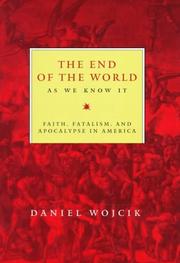
ISBN: 0814795005 0585480095 9780585480091 9780814795002 0814792839 9780814792834 Year: 1999 Publisher: New York, NY
Abstract | Keywords | Export | Availability | Bookmark
 Loading...
Loading...Choose an application
- Reference Manager
- EndNote
- RefWorks (Direct export to RefWorks)
From religious tomes to current folk prophesies, recorded history reveals a plethora of narratives predicting or showcasing the end of the world. The incident at Waco, the subway bombing by the Japanese cult Aum Supreme Truth, and the tragedy at Jonestown are just a few examples of such apocalyptic scenarios. And these are not isolated incidents; millions of Americans today believe the end of the world is inevitable, either by a divinely ordained plan, nuclear catastrophe, extraterrestrial invasion, or gradual environmental decay, Examining the doomsday scenarios and apocalyptic predictions of visionaries, televangelists, survivalists, and various other endtimes enthusiasts, as well as popular culture, film, music, fashion, and humor, Daniel Wojcik sheds new light on America's fascination with worldly destruction and transformation. He explores the origins of contemporary apocalyptic beliefs and compares religious and secular apocalyptic speculation, showing us the routes our belief systems have traveled over the centuries to arrive at the dawn of a new millennium. Included in his sweeping examination are premillennial prophecy traditions, prophecies associated with visions of the Virgin Mary, secular ideas about nuclear apocalypse, the transformation of apocalyptic prophecy in the post-Cold War era, and emerging apocalyptic ideas associated with UFOs and extraterrestrials. Timely, yet of lasting importance, The End of the World as We Know It is a comprehensive cultural and historical portrait of an age-old phenomenon and a fascinating guide to contemporary apocalyptic fever.
End of the world. --- Millennialism --- World, End of the --- Eschatology --- Amillennialism --- Chiliasm --- Millenarianism --- Millennianism --- Postmillennialism --- Premillennialism --- Dispensationalism --- Fundamentalism --- Millennium (Eschatology) --- United States --- Religion --- Jonestown. --- Waco. --- apocalypse. --- books on apocalypse. --- divine plan. --- doomsday scenarios. --- endtimes. --- extraterrestials. --- predictions of future. --- prophecies of doomsday. --- religious fanatics. --- survivalists.
Book
ISBN: 1469610027 9781469610023 9798890874788 Year: 1979 Publisher: Chapel Hill The University of North Carolina Press
Abstract | Keywords | Export | Availability | Bookmark
 Loading...
Loading...Choose an application
- Reference Manager
- EndNote
- RefWorks (Direct export to RefWorks)
Adas explores the relationship between millenarianism and violent protest by focusing on five case studies representing a wide range of social, political, and economic systems. The rebellions examined are: Netherlands East Indies (1825-30), New Zealand (c. 1864-67), Central India (1895-1900), German East Africa (1903-6), and Burma (1930-32). Arranged topically to emphasize comparative patterns, the study analyzes causes, leaders, organization, failure, and the impact on the individual society. Originally published in 1979.
Colonies --- Indigenous peoples --- Government, Resistance to --- Millennialism --- Amillennialism --- Chiliasm --- Millenarianism --- Millennianism --- Postmillennialism --- Premillennialism --- Dispensationalism --- Fundamentalism --- Millennium (Eschatology) --- Civil resistance --- Non-resistance to government --- Resistance to government --- Political science --- Political violence --- Insurgency --- Nonviolence --- Revolutions --- Aboriginal peoples --- Aborigines --- Adivasis --- Indigenous populations --- Native peoples --- Native races --- Ethnology --- Anti-colonialism --- Colonial affairs --- Colonialism --- Neocolonialism --- Imperialism --- Non-self-governing territories --- Colonization --- Political resistance
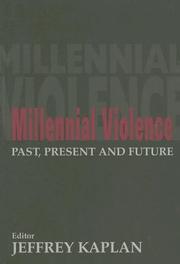
ISBN: 0714682594 1315040166 1135316260 9781135316266 1299868258 9781299868250 9781315040165 0714652946 9780714652948 9780714682594 1135316333 9781135316334 Year: 2002 Publisher: London Portland, OR.
Abstract | Keywords | Export | Availability | Bookmark
 Loading...
Loading...Choose an application
- Reference Manager
- EndNote
- RefWorks (Direct export to RefWorks)
This volume encompasses an array of material exploring the millennium phenomenon and the violent excitement it provokes. Consisting of three core parts, the book combines pertinent documents with insightful commentary and discussion.
Violence --- Two thousand, A.D. --- Millennialism. --- Amillennialism --- Chiliasm --- Millenarianism --- Millennianism --- Postmillennialism --- Premillennialism --- Dispensationalism --- Fundamentalism --- Millennium (Eschatology) --- 2000 A.D. --- Year 2000, A.D. --- Year two thousand, A.D. --- Twentieth century --- Twenty-first century --- Violence (in religion, folklore, etc.) --- Religious aspects. --- Moral and religious aspects --- violence - religious aspects --- 2000, A.D. --- millennialism --- terrorism --- political violence

ISBN: 9053564381 Year: 2000 Volume: 75 Publisher: Amsterdam Amsterdam University Press
Abstract | Keywords | Export | Availability | Bookmark
 Loading...
Loading...Choose an application
- Reference Manager
- EndNote
- RefWorks (Direct export to RefWorks)
Uit een opiniepeiling gehouden in opdracht van het Amerikaanse Newsweek blijkt dat bijna de helft van de Amerikaanse bevolking, of ze nu christen zijn of niet, gelooft dat de wereld eindigt met een allesbeslissende slag tussen Christus en de Antichrist in Armageddon. De huidige aardbevingen overstromingen en wervelstormen, 'nieuwe' ziektes als aids en het Ebola-virus als mede de gewelddadige gebeurtenissen in de samenleving vormen een voorbode voor het komende einde, aldus de 'eindtijdgelovigen' in dezelfde opiniepeiling. In Maar nog is het einde niet wordt, onder redactie van dr Durk Huite Hak en dr Lammert Gosse Jansma, door een keur van deskundige auteurs aandacht besteedt aan eindtijdbewegingen. Allereerst een historisch gedeelte met aandacht voor het jaar 1033 en 1533, en een eigentijds gedeelte waarin aandacht wordt besteed aan eindtijdbewegingen van deze eeuw. Aan de orde komen verder zaken als het eindtijdenken in de gevestigde millennistische kerkgenootschappen: Getuigen van Jehova en De Kerk van Jezus Christus van de Heiligen der Laatste Dagen, het eindtijddenken in de traditionele christelijk kerken, in het Jodendom, Boeddhisme, Hindoeïsme en Islam en ten slotte het geseculariseerd millennium (ufologie, dierenbestrijders, survivalists, aum, maria devi, etc). (Bron: covertekst)
Eschatology. --- Millennialism. --- Sociology of religion --- godsdienstsociologie --- Millennialism --- History --- Eschatology --- 115 --- 24 --- godsdienst --- hindoeïsme --- islam --- jodendom --- New Age --- #PBIB:2001.1 --- #PBIB:gift 2001 --- #SBIB:316.331H593 --- #KVHB:Chiliasme --- #KVHB:Godsdienst --- 081 Godsdienst --- Amillennialism --- Chiliasm --- Millenarianism --- Millennianism --- Postmillennialism --- Premillennialism --- Dispensationalism --- Fundamentalism --- Millennium (Eschatology) --- Last things (Theology) --- Religious thought --- Theology, Doctrinal --- 2 --- Godsdienstige bewegingen: messianisme, millenarisme, prophetisme --- Godsdienst --- Sekten --- Sekte --- Filosofie --- Psychologie --- Sociologie --- Man --- Cultuur --- Erfelijkheidsleer --- Stadssamenleving --- Verpleegkunde --- Volwassene
Book
ISBN: 0674036298 0674054806 9780674036291 9780674054806 Year: 2009 Publisher: Cambridge Harvard University Press
Abstract | Keywords | Export | Availability | Bookmark
 Loading...
Loading...Choose an application
- Reference Manager
- EndNote
- RefWorks (Direct export to RefWorks)
Brett Whalen explores the compelling belief that Christendom would spread to every corner of the earth before the end of time. During the High Middle Ages - an era of crusade, mission, and European expansion - ;the Western followers of Rome imagined the future conversion of Jews, Muslims, pagans, and Eastern Christians into one fold of God's people, assembled under the authority of the Roman Church.
History --- Millennialism --- Popes --- Church history --- Religious aspects --- Christianity --- History of doctrines --- Temporal power --- Europe --- Holy See --- See, Holy --- Amillennialism --- Chiliasm --- Millenarianism --- Millennianism --- Postmillennialism --- Premillennialism --- Middle Ages, 600-1500 --- -Millennialism --- -Popes --- -273.16 --- 273.16 Millenarisme --- Millenarisme --- Dispensationalism --- Fundamentalism --- Millennium (Eschatology) --- -Temporal power --- -Millenarisme --- Millénarisme --- Papes --- Pouvoir temporel --- Papacy --- 27 "04/14" --- 273.16 --- Kerkgeschiedenis--Middeleeuwen --- Christian church history --- Christian dogmatics --- anno 500-1499 --- Histoire --- Eglise --- Aspect religieux --- Christianisme --- Histoire des doctrines --- Histoire religieuse
Book
ISBN: 0773598502 0773598499 9780773598492 9780773546790 0773546790 9780773598508 Year: 2016 Publisher: Montreal
Abstract | Keywords | Export | Availability | Bookmark
 Loading...
Loading...Choose an application
- Reference Manager
- EndNote
- RefWorks (Direct export to RefWorks)
"Apocalyptic millennialism is embraced by the most powerful strands of evangelical Christianity. The followers of these groups believe in the physical return of Jesus to Earth in the Second Coming, the affirmation of a Rapture, a millennium of peace under the rule of Jesus and his saints, and, at last, final judgment and deep eternity. In Discovering the End of Time, Donald Akenson traces the primary vector of apocalyptic millennialism to a specific locale in southern Ireland in the 1820s and '30s. Surprisingly, these apocalyptic concepts--which many scholars associate with the poor, the ill-educated, and the desperate--were articulated most forcefully by a rich, well-educated band of elite Irish Protestants. Drawing a striking portrait of John Nelson Darby, the major figure in the evolution of evangelical dispensationalism, Akenson demonstrates Darby's formative influence on ideas that later came to have a foundational impact on American evangelicalism in general and on Christian fundamentalism in particular. Careful to emphasize that recognizing the origins of apocalyptic millennialism in no way implies a judgment on the validity of its constructs, Akenson draws on a deep knowledge of early nineteenth-century history and theology to deliver a powerful history of an Irish religious elite and a major intersection in the evolution of modern Christianity. Opening the door into an Ireland that was hiding in plain sight--to a culturally and financially rich community that centred on radical evangelicalism and, for many, the return to earth of Jesus and the apocalyptic reorganization of all human life--Discovering the End of Time tells a remarkable story, at once erudite, conversational, and humorous, and characterized by an impressive range and depth of research."--
Evangelicalism --- Protestants --- Millennialism --- Elite (Social sciences) --- Évangélisme --- Millénarisme --- Élite (Sciences sociales) --- Evangelical religion --- Protestantism, Evangelical --- Evangelical Revival --- Fundamentalism --- Pietism --- Protestantism --- Elites (Social sciences) --- Leadership --- Power (Social sciences) --- Social classes --- Social groups --- Amillennialism --- Chiliasm --- Millenarianism --- Millennianism --- Postmillennialism --- Premillennialism --- Dispensationalism --- Millennium (Eschatology) --- Christians --- History --- Histoire --- Darby, J. N. --- Darby, John Nelson, --- D., J. N. --- Dārbī, Yūḥannā, --- داربي، يوحنا --- Influence. --- Ireland --- Irlande --- Church history --- Histoire religieuse
Book
ISBN: 0631119507 0631119604 9780631119609 9780631119500 Year: 1969 Publisher: Oxford Blackwell
Abstract | Keywords | Export | Availability | Bookmark
 Loading...
Loading...Choose an application
- Reference Manager
- EndNote
- RefWorks (Direct export to RefWorks)
Ethnology --- Millennialism --- Nativistic movements --- #SBIB:316.331H593 --- 298.9 --- 299.6*1 --- Ethnic revivals --- Messianic cults --- Prophetistic movements --- Sects, Nativistic --- Cults --- Nationalism --- Religion --- Messianism --- Amillennialism --- Chiliasm --- Millenarianism --- Millennianism --- Postmillennialism --- Premillennialism --- Dispensationalism --- Fundamentalism --- Millennium (Eschatology) --- Cultural anthropology --- Ethnography --- Races of man --- Social anthropology --- Anthropology --- Human beings --- 298.9 Recente niet-christelijke of afgeleid-christelijke religies; New Age --- Recente niet-christelijke of afgeleid-christelijke religies; New Age --- 299.6*1 Nieuwe Afrikaanse godsdiensten: Kimbangisme; messiaanse bewegingen --- Nieuwe Afrikaanse godsdiensten: Kimbangisme; messiaanse bewegingen --- Godsdienstige bewegingen: messianisme, millenarisme, prophetisme --- Nativistic movements. --- Millennialism. --- Ethnology.
| Listing 1 - 10 of 15 | << page >> |
Sort by
|

 Search
Search Feedback
Feedback About UniCat
About UniCat  Help
Help News
News